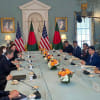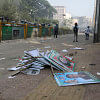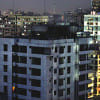A short history of AL’s challenging times

The ruling Awami League has proven to be resilient during all kinds of crises – political and economic. The party's strength is its army of selfless activists (all the way down to the grassroots) who dedicate themselves to uphold its image and glory. The AL has been known for its mastery in conducting strong campaigns on the streets right from the days of its foundation in the pre-Bangladesh era, amid much adversity and under a hostile regime. The party faced a serious leadership crisis when Bangabandhu Sheikh Mujibur Rahman, along with his family members, was assassinated. But the AL rose again like a phoenix. After being out of the office for 21 years at a stretch, the party came to power with the people's mandate.
Even when the party assumed office in 2009 with a landslide victory, it faced challenges in bringing its internal politics in order. But it weathered through the strife. Barely two months in office, the party also had to contend with the Pilkhana tragedy. Soon after, there was the month-long Shahbag protests to deal with. There was also Hefazat-e-Islam's march towards Dhaka in 2013, which had brought the entire city to a standstill. But Awami League handled all that with a strong hand, so well that Hefazat now is a "friend". In fact, the Hefazat-e-Islam referred to Awami League president Sheikh Hasina as "Qawmi janani" ("mother of the Qawmi").
But the first serious jolt for the AL government arguably came when the United States imposed sanctions on the Rab and some of its current and former top officials for human rights violations. This has possibly been the most pressure the government has faced in its three consecutive terms in office.
Then, following the annulment of the caretaker government system from the Constitution, opposition parties took to the streets and challenged the government. There were vigorous demonstrations and people were killed. Dhaka city had become virtually isolated from the rest of the country. The situation was as if the government might be toppled at any time before the January 2014 election. But again, the ruling party overcame the situation and formed a government, thanks to the BNP's boycott of the election.
The opposition was simply clueless as to where to go or what to do. So, the political situation was quite favourable for the Awami League, as there was almost no one to challenge. But the heinous terrorist attacks, beginning with the one at Holey Artisan Bakery, came next. Many foreign nationals were killed and the world was left shocked. The government announced its war on terror and quite successfully stemmed militancy. So, from political opponents to militancy – the ruling Awami League showed its resilience in the face of crisis time and again.
Compared to 2014, the situation in 2018 was far easier for the ruling party as BNP had joined the polls with almost no preparation and the party chairperson Khaleda Zia was behind bars following a court verdict. That election was not above controversies though, since there were numerous allegations of ballot-stuffing and "voting by night". But that did not keep Awami League from taking office again.
During its years of governance, the country fared well. Harvests were reasonably good, and food prices never got completely out of hand. The grim power and energy situation of BNP's last days saw an improvement quickly after Awami League took over. The ruling party fared reasonably well in international circles as well, solidifying its relationship with India and laying the foundation for a stronger Chinese involvement in Bangladesh. The government also managed to get a grip on the Rohingya crisis, which had all the potential to get out of hand.
But the first serious jolt for the AL government arguably came when the United States imposed sanctions on the Rab and some of its current and former top officials for human rights violations. This has possibly been the most pressure the government has faced in its three consecutive terms in office. Those sanctions worked, though. Extrajudicial killings plummeted to nearly zero, which encouraged the opposition party members to take to the streets. Then, the BNP held rallies in divisional headquarters with a massive participation. But the party lost the momentum when they tried to hold a rally in Dhaka. Here again the ruling party played a tactical card with its choice of venue for the opposition rally. The ruling party kept the BNP busy over the venue issue and created obstacles at different entry points of Dhaka – as it had done during other divisional rallies – so that BNP loyalists couldn't join the Dhaka rally.
Although there was no big natural calamity, the Covid pandemic brought about a situation that the world could not have anticipated. Economic crisis was severe in many countries, the weak healthcare system was exposed globally, and the vaccine crisis paralysed many economies. But again, the Bangladesh government successfully tackled the pandemic period by managing the economy and administering vaccines.
But when the world was still recovering from the Covid crisis, we witnessed another polarisation in the form of the Russia-Ukraine war. This led to a record inflation, a dollar crisis, and weakened the economic status of many countries. Bangladesh has been no exception.
Even after this, the ruling party was still quite confident about the next election. But things started changing when the electricity crisis became a major concern, harkening back to the days when the Awami League government had first taken office in 2009. This also happened at a time when the prices of essentials began skyrocketing. To make matters worse, Bangladesh is seeing one of its hottest years with prolonged heatwaves plaguing the population and worsening the power crisis.
Amid rising inflation, rampant loadshedding, and a very discontented electorate, the US government announced visa restrictions. Under the new policy, the US will be able to restrict the issuance of visas for any Bangladeshi individual believed to be responsible for, or complicit in, undermining elections through any means. This includes individuals employing measures to prevent political parties, voters, civil society, or the media from disseminating their views in Bangladesh. Current and former Bangladeshi officials, members of pro-government and opposition political parties, members of law enforcement, the judiciary, and security services all fall under the purview of this visa policy. And this has added to what must have already been a throbbing headache for the Awami League.
With Bangladesh's forex reserves dwindling fast, the high fuel prices, no visible respite from a power crisis (worsened by an uncharacteristic stretch of heatwaves), and political opponents freely flexing their muscles, could it be that the Awami League has run out of its amazingly long streak of good luck? The next few months are perhaps going to be the toughest test for Awami League's resilience in recent history.
Mohammad Al-Masum Molla is chief reporter at The Daily Star.


 For all latest news, follow The Daily Star's Google News channel.
For all latest news, follow The Daily Star's Google News channel. 










Comments